You can reduce taxes and save for retirement by contributing to a tax-advantaged retirement plan. If your employer offers a 401(k) or Roth 401(k) plan, contributing to it is a tax wise way to build a nest egg.
If you’re not already contributing the maximum allowed, consider increasing your contribution rate between now and year end. Because of tax-deferred compounding (tax-free in the case of Roth accounts), boosting contributions sooner rather than later can have a significant impact on the size of your nest egg at retirement.
With a 401(k), an employee elects to have a certain amount of pay deferred and contributed by an employer on his or her behalf to the plan. The contribution limit for 2019 is $19,000. Employees age 50 or older by year end are also permitted to make additional “catch-up” contributions of $6,000, for a total limit of $25,000 in 2019.
The IRS just announced that the 401(k) contribution limit for 2020 will increase to $19,500 (plus the $6,500 catch-up contribution).
A traditional 401(k)
A traditional 401(k) offers many benefits, including these:
- Contributions are pretax, reducing your modified adjusted gross income (MAGI), which can also help you reduce or avoid exposure to the 3.8% net investment income tax.
- Plan assets can grow tax-deferred — meaning you pay no income tax until you take distributions.
- Your employer may match some or all of your contributions pretax.
Take a look at your contributions for this year. If your current contribution rate will leave you short of the limit, try to increase your contribution rate through the end of the year to get as close to that limit as you can afford. Keep in mind that your paycheck will be reduced by less than the dollar amount of the contribution, because the contributions are pretax — so, income tax isn’t withheld.
Roth 401(k)
Employers may also include a Roth option in their 401(k) plans. If your employer offers this, you can designate some or all of your contributions as Roth contributions. While such contributions don’t reduce your current MAGI, qualified distributions will be tax-free.
Roth 401(k) contributions may be especially beneficial for higher-income earners, because they don’t have the option to contribute to a Roth IRA. Your ability to make a Roth IRA contribution in 2019 will be reduced if your adjusted gross income (AGI) in 2019 exceeds:
- $193,000 and your filing status in 2019 is married-filing jointly, or
- $122,000, and your filing status in 2019 is that of a single taxpayer.
Your ability to contribute to a Roth IRA in 2019 will be eliminated entirely if you’re a married-filing-jointly filer and your 2019 AGI equals or exceeds $203,000. The cutoff for single filers is $137,000 or more.
How much and which type
Do you have questions about how much to contribute or the best mix between regular and Roth 401(k) contributions? Contact your DDK tax advisor to discuss the tax and retirement-saving considerations in your situation.



